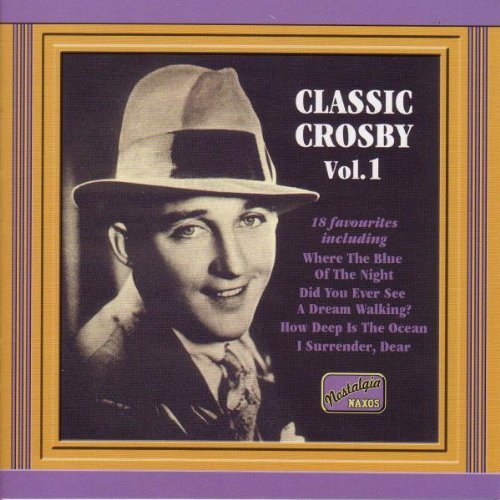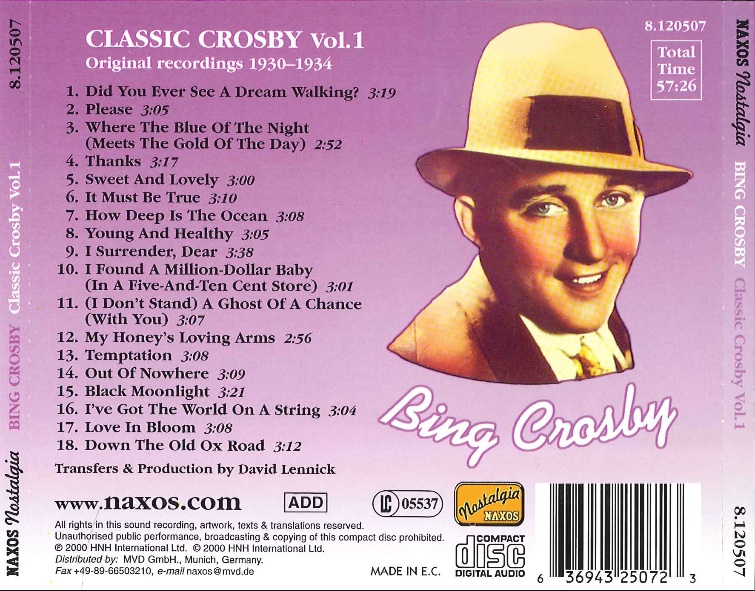Logowanie
Dziś nikt już tak genialnie nie jazzuje!
Bobby Hutcherson, Joe Sample
San Francisco
SHM-CD/SACD - NOWY FORMAT - DŻWIĘK TAK CZYSTY, JAK Z CZASU WIELKIEGO WYBUCHU!
Wayne Shorter, Freddie Hubbard, Herbie Hancock, Ron Carter, Elvin Jones
Speak no evil
UHQCD - dotknij Oryginału - MQA (Master Quality Authenticated)
Chesky! Niezmiennie perfekcyjny
Winylowy niezbędnik
ClearAudio
Double Matrix Professional - Sonic
najbardziej inteligentna i skuteczna pralka do płyt winylowych wszelkiego typu - całkowicie automatyczna
Bing Crosby
Classic Crosby Vol.1

- Bing Crosby - vocal
"CLASSIC CROSBY Volume 1 As the centenary of his birth approaches, Harry Lillis "Bing" Crosby (1903-1977) remains a world-acclaimed entertainer New biographies continue to appear, hundreds of his 1700-plus recordings remain "in print," and his films (White Christmas especially) are television staples. By many measures (total sales, gold albums, number one singles) he is as successful as any popular singer of his century. His appealing and influential "crooning" vocal style was, fortunately, developed just as electrical recording and sound amplification allowed intimate singing voices to be successfully recorded, broadcast, and heard above a full orchestra. Many of the songs on this compilation were sung by Crosby in his early-1930s feature films and shorts: I Surrender, Dear (the title song and "Out of Nowhere"), Dream House ("It Must be True"), Confessions of a Co-ed ("Out of Nowhere"), The Big Broadcast ("Where the Blue of the Night" and a reprise of "I Surrender, Dear"), Please (the title song and "A Ghost of a Chance"), College Rhythm ("Down the Old Ox Road" and "I Surrender, Dear" yet again), and Too Much Harmony ("Thanks" and "Black Moonlight"). The rest are film or theatre songs first introduced by others and the occasional independent pop song not originating in Hollywood or on Broadway. The broad outline of Crosby's early years is familiar to many born in Tacoma, Washington, he was raised in Spokane. He attended Gonzaga University (later the benefactor of his largesse in many ways) and took his first singing engagements there, eventually teaming with pianist Al Rinker. Heard by bandleader Paul Whiteman in 1926, the pair were soon joined with Harry Barris to form the Rhythm Boys, Whiteman's featured vocal trio National exposure followed, as did their first recordings After making their break with Whiteman in the spring of 1930, the trio worked in Los Angeles, most notably at the Cocoanut Grove accompanied by Gus Amheim's Orchestra. Crosby shares the spotlight with the Arnheim ensemble in Harry Harris's It Must Be True The earlier-postponed filming of Universal's The King of jazz (reuniting Crosby with the Whiteman orchestra) began late in 1930, ending the following March He again teamed with Arnheim on Crosby's first hit record, "I Surrender, Dear. The song, another Harris creation, is heard here in an elaborate, unsuited-for-dancing "production number" arrangement. Crosby's initial (March 1931) recording session for Brunswick included Out of Nowhere, and he is fully the focus of this relaxed, unadorned performance Another Brunswick session three months later included, verse intact, I Found a Million-Dollar Baby from the then-current Broadway revue Crazy Quilt. Late summer and fall 1931 were devoted to theatre and radio work in New York. "Sweet and Lovely" was recorded just as NBC had engaged vocalist Russ Columbo (formerly an Amheim violinist) to compete with Crosby's nightly CBS program in the so-called "battle of the baritones" Crosby is effortlessly note-perfect on the tricky melody and includes some trombone-like embellishments in his second chorus. Crosby sang "Where the Blue of the Night" in The Big Broadcast, his first starring role in a major film This 1931 performance, with Crosby's verse, is his first recording of what would become his signature song. Late in 1931 a few weeks of rest were prescribed for Crosby's overworked instrument, though he was certain his voice "came back a tone or two lower than it was before." The September 1932 recording of Please was completed while Crosby was smashing box office records at San Francisco's Paramount. This performance provides a brief resume of his singing style-the cantabile "crooning," whistling, and wordless scat-styled singing. "How Deep is the Ocean" and "A Ghost of a Chance were recorded the day The Big Broadcast opened in New York. The former is his only recording of this wistful Irving Berlin creation, though he sang it once more in the all-Berlin film Blue Skies (1946). The equally-durable, bittersweet standard "A Ghost of a Chance" was sung by Crosby in Paramount's 1933 Please. Crosby joined forces with the Lombardo unit in a bouncing two-beat rendition of Young and Healthy (from the film musical 42nd Street). The performance includes a generous helping of jazzy vocal improvisation (listen for a quote from Gershwin's "Oh, Lady Be Good") and light-hearted whistling. Crosby's associations with Tommy (trombone) and Jimmy (clarinet/saxophone) Dorsey included recordings, radio, and film Their early 1933 session together yielded an exuberant My Honey's Loving Arms (1922) - the only song on this collection not essentially "brand new" when Crosby recorded it. The band's propulsive accompaniment alternates faultlessly with the Mills Brothers' uncanny quasi-instrumental vocal effects, supported only by rhythm guitar A pleasant bonus in the lightly swinging "I've Got the World on a String", also from this session, is Crosby's inclusion of its rarely-heard verse. Crosby's activities in the spring of 1933 included the filming of College Humor, Too Much Harmony, and Going Hollywood and his ongoing radio broadcasts for chesterfield A jaunty verse precedes a sentimental-yet-sly chorus of "Down the Old Ox Road". In his memoir Call Me Lucky Crosby described the song's locale as "a petting pit or smooching station on any campus." The lyric concludes with directness "Why keep waiting and debating when you know it's time for mating on the old Ox Road?" Two months later, Crosby and Jimmie Greer's orchestra returned to the studio, the session including more Coslow-Johnston film songs, "Thanks" and Black Moonlight". The former, written as something of a sequel to Leo Robin and Ralph Rainger's "Please" (track 2) remains the more durable of the pair. Described by one writer as Crosby's "first staged dramatic song" in a film, Temptation was heard in Going Hollywood. Bandleader Lennie Hayton, also the film's musical director, is heard here in a brief piano interlude The peripatetic Crosby's twelfth recording session of 1933 included "Did You Ever See a Dream Walking?" from the Ginger Rogers film musical Sitting Pretty. Crosby's lilting performance again includes the song's verse; the recording was, happily, introduced to a new generation in the 1982 film Pennies From Heaven. Going Hollywood, released late in 1933, vaulted Crosby to top-ten box office status. The opportunity to record with him was surely irresistible to bandleader Irving Aaronson Crosby had duetted with Kitty Carlisle on "Love in Bloom" in 1934's The Loves Me Not, and he handles its chromatic intricacies with ease in the solo recording heard here. The song remains a standard, principally due to its adoption as comedian Jack Benny's signature tune. Crosby's July 1934 session for Brunswick was his last; he then began a 21-year association with Decca that, independent of his other ventures, made him rich. The new, intimate style of popular singing would be identified as much with Bing Crosby as with any other vocalist, and he entered the mid-1930s as an internationally known singer, actor, and "personality, " with the height of his stardom still ahead. George J. Ferencz Transfers' David Lennick Digital Noise Reduction Graham Newton"


































